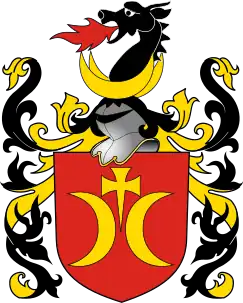Danielewicz is a patronymic surname, meaning descendants of Daniel or Danilo. Several Danielewicz families were members of Polish–Lithuanian Commonwealth nobility and their descendants continue to the present.
Danielewicz families
Spelling: Danielewicz, Danilewicz, Daniłowicz, Daniełowicz, Danieliwicz, Danielewitz and en: Danilovich.
The family in Russia that took their name after Daniel goes back to Daniel of Moscow.[1] Daniel's son Afanasy Danilovich was the Prince of Novgorod (died 1322) followed by Yury Danilovich, the prince of Moscow and Novgorod. In the 15th century another family is mentioned in the chronicles: Daniel Alexandrovich and his son Vladimir Danilovich were elected as princes of Pskov. Vladimir Danilovich (Danielewicz) settled down in Lithuania and his descendants used Ostoja Coat of Arms[2][3]
- Ostoja Danielewicz family: (Danielewicz of Ostoja Coat of Arms, Danielewicz of clan Ostoja, Polish: Danielewicz herbu Ostoja) - from 14th century in Pskov and in 15th century in Lithuania, Belarus and later in 18-19th century also in Volyn, Prussia and Poland. This family is the first to use surname Danielewicz.
- Danielewicz of Rola coat of arms[4] - in Volyn, Ukraine and later Poland. From late 15th century.
- Danielewicz of Leliwa coat of arms[4] - in Lithuania. There are no records referring to the origin of this family, possibly it is line of Ostoja Danielewicz that later used Leliwa CoA from 17th century.
- Danielewicz of Grzymala coat of arms[5] - in Lithuania and Prussia 18th century
- Danielewicz of Sas coat of arms[6] - in Ukraine of tatar or kosac origin holding CoA that is called "variant of Sas", 19th century.
- Danielewicz of own CoA, In Prussia according to Siebmachers Wappenbuch[7] in 19th century.
Furthermore, in the Armorial of Tadeusz Gajl there are more families of different clans listed with different spelling. Daniełowicz - clan Godziemba and Sas, Daniłowicz - clan Leliwa, Ostoja, Rola, Sas and Sulima, Danielewicz - clan Godziemba, Ostoja and Rola, Danilewicz - clan Boncza I, Leliwa, Ostoja, Prus I and Sas, Danieliwicz - clan Ostoja.[8]
All above are noble families of Danielewicz vel Danilewicz being part of different clans and not family related with each. Below, CoA of Rola, Sas, Grzymała, Godziemba, Sulima, Bończa, Prus and Ostoja.
Gallery
See also
Lists of people with related surnames:
References
- ↑ Jan Ciechanowicz
- ↑ The Pskov 3rd Chronicle, 2nd edition by David Savignac, Beoulf Sons, Crofton 2016. Year 1434: That winter, on February 28, Prince Aleksandr Fedorovich and his entire household left Pskov for Moscow. He had been prince on three different occasions and had lived in Pskov for a total of twelve years. On that same day his son-in-law, Prince Vladimir Danilovich, arrived in Pskov from Lithuania, where he had been living for the previous ten years. Vladimir Danilovich was the prince of Pskov from the end of February 1434 to November 1435, and he was the Pskov vicegerent of Grand Prince Vasily Vasilyevich from April 1436 until ~1438/1439. PBS 2002, p. 95. 3. The grammar is fractured in this passage. The sense was restored by using the text of the account in the Pskov 1st Chronicle (p. 42) In Russian, Danilovich was a patronymic but in Lithuania it became a surname in the 15th century due to the influence of Poland and the Union of Horodło
- ↑ According to Jan Ciechanowicz, in 15th century there was only one family noted with surname Danielewicz in Grand Duchy of Lithuania
- 1 2 Adam Boniecki: Herbarz polski. Warszawa: skł. gł. Gebethner i Wolff, 1913Adam Boniecki: Herbarz polski. T. 16. Warszawa: skł. gł. Gebethner i Wolff, 1913
- ↑ Andrzej Brzezina Winarski, Herby Szlachty Rzeczpospolitej,ISBN 83-89667-42-8
- ↑ Seweryn Uruski: Rodzina.Herbarz szlachty polskiej, Warszawa 1906
- ↑ Siebmachers Wappenbuch
- ↑ "Herbarz". gajl.Wielcy.pl. Retrieved 26 October 2017.







